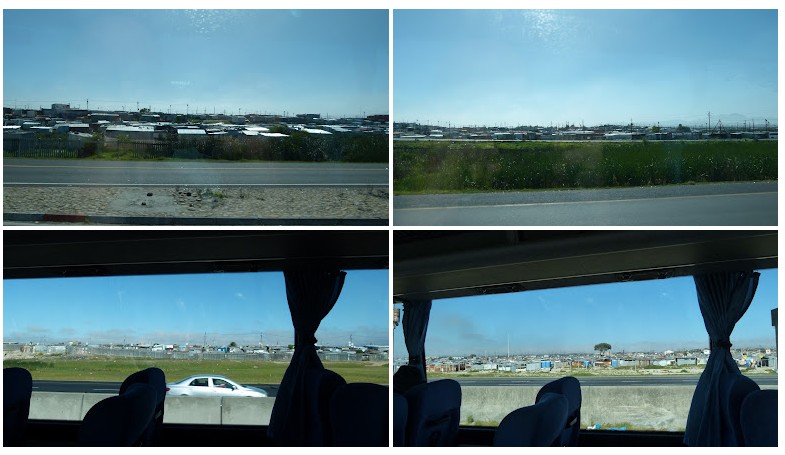Cape Town is the country's legislative capital and location of the South African Parliament.
It's long been renowned for Table Mountain, that dominates the city.

Our tour included a bus trip out, along the western beaches, to the southern tip of Africa - Cape Point - The Cape of Good Hope - and the historic lighthouse there. Wildlife included several ostriches and the ever-present baboons. We also called in at a penguin colony and the very impressive botanic gardens.
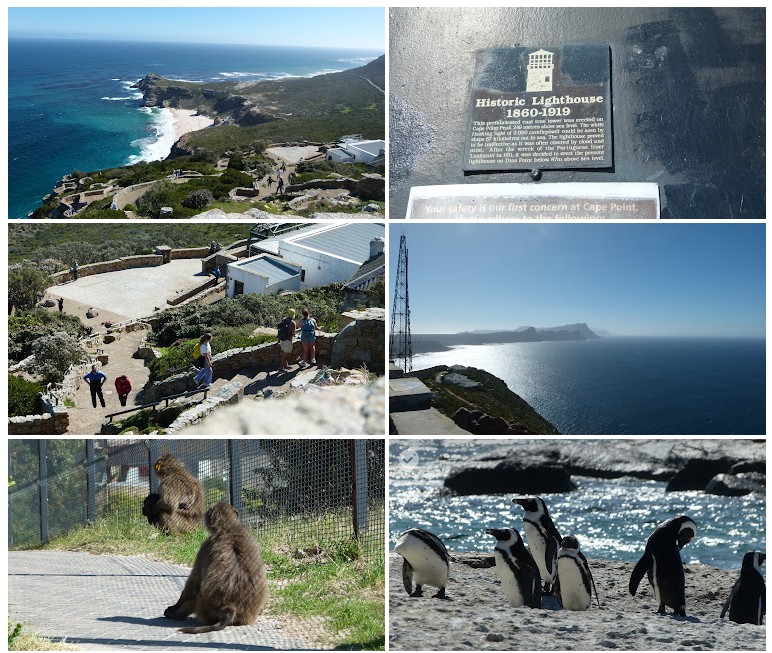
The botanic gardens revealed - not for the last time - the close historical connection between South Africa and Australia, as the first Europeans in Australia generally came this way and picked up plants for their gardens and for agriculture on the way. And, of course: sheep, horses and cattle.

Later, the connection was strengthened by the Boer War, participation in which was the first time that British troops were identified separately as Australian (including New Zealand), an important political step leading to Australian Federation in 1901. In that event, New Zealand failed to to become part of the Federation and became a separate country. The Australian Constitution still leaves joining an option open to them.
The Australians, like the Boer, were admired for their horsemanship and consequent ability to play the Boer guerrillas at their own game. The film 'Breaker Morant' recalls a series of incidents during that war.
That war was interesting, on several other grounds. Most importantly, it had its roots in slavery.
The early settlers the (Dutch) Boer farmers insisted, as had the farmers in the southern states of the USA, that their slaves were essential to commercial agriculture. But 1834 Britain abolished slavery throughout the Empire. So the Boer rebelled against 'Imperial interference'.
In 1867, diamonds were discovered near Kimberley in what is today known as the Northern Cape. Now, additional central African workers needed to be imported as the small indigenous 'bushmen' were thin on the ground and/or unwilling or unable to undertake heavy work. Today, Bushmen remain a small minority, distinguished by their 'click' language.
These grievances festered, culminating in the First Boer War in 1880-81. Using 'guerrilla tactics' the Boer side won. A compromise was reached with the British in which former slaves became 'black workers', yet remained strictly segregated.
In 1886 the discovery of gold near Johannesburg had resulted in a large number of 'foreigners' flooding in, unrestricted by the British. Now many more central African workers were required to mine gold.
This strict racial segregation became codified after an incident at Pietermaritzburg in 1893, when a young Indian lawyer, later to be known as Mahatma Gandhi, was thrown out of a 'whites only' carriage on a train. The highly indignant Gandhi, who was from a noble family and had recently gained his law degree in London, then campaigned, successfully, for a legally defined 'coloured' class to share many 'white' privileges. This experience was formative and lessons learnt were later useful in his, eventually successful, campaign to expel the British from India.
The Boer were not happy either and in 1899 the Second Boer War erupted. After three years of fighting the Boer capitulated.
The Second Boer War was a formative was a experience for Winston Churchill, who was a war correspondent in South Africa. Although nominally a non-combatant, in 1899 he joined an armed attempt to rescue a train under attack. Churchill was captured and spent three months as a Boer prisoner of war, before he managed to escape.
Simultaneously, the experiences of Rudyard Kipling who also covered the Boer War as a newspaper correspondent, contributed to this later founding of the Scouting movement.
After the war the economy grew to be the wealthiest in Africa, while the segregated black African population numbers exploded as immigrants from elsewhere in Africa joined an ever growing domestic population in 'townships'.
In 1947 my English parents, who were considering South Africa as a possible new home, chose Australia instead, after listening to short-wave radio stations in each country. Growing racial tensions in South Africa decided the issue.
In 1948 'Apartheid' was constitutionalised, to international condemnation, except by some prominent politicians in the American south.
It was this Apartheid that eventually led to the country's expulsion from the British Commonwealth, in 1961.
***
Back to the package tour:
Table mountain was not included in the pre-paid agenda so we got a cab and did out own thing, encountering several others from our group.
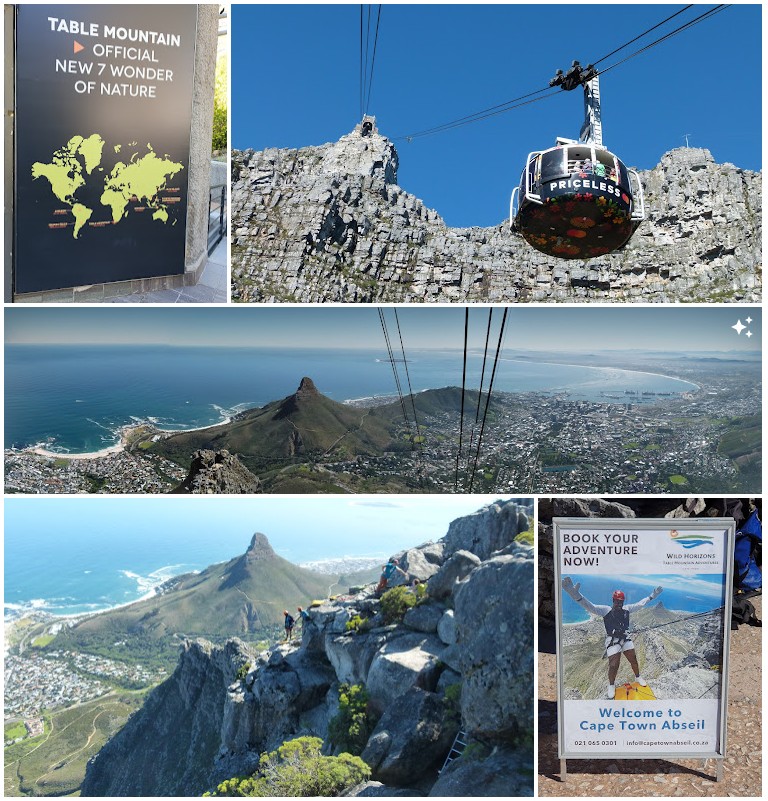
One can go up using the cable car and descend another way but we had already paid for a return journey so, decided not to take one of the other ready options. One is much slower than the other, as it employs a rope to moderate one's descent.
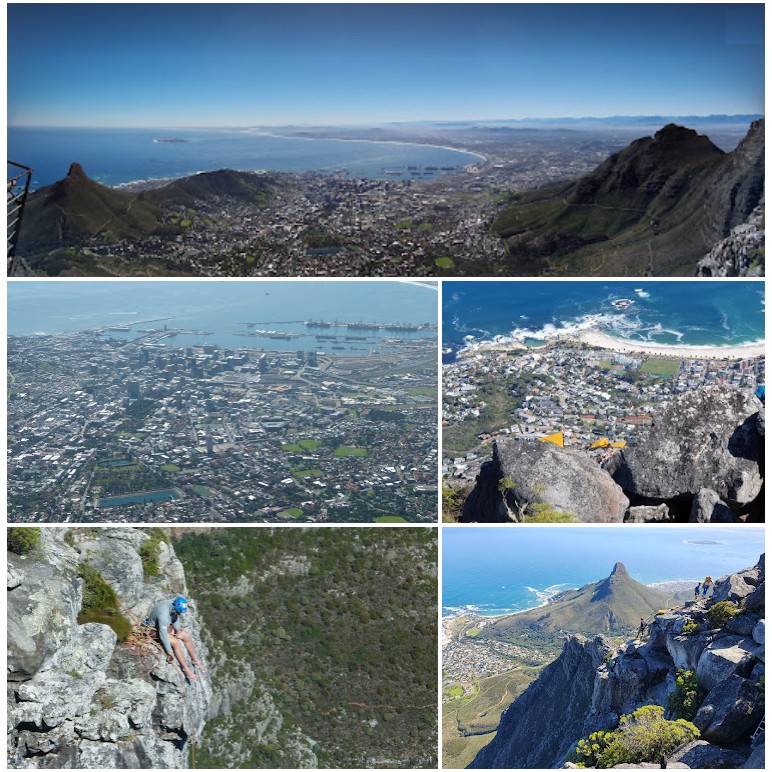
On our way back from the cable car we stopped off at Bo-Kaap, at the foot of Signal Hill.
Here a small section of historic workers cottages, in what was once the Muslim sector, have been dressed up as a tourist attraction.
While there, we wanted water and went to a corner store to buy some. The little store, selling nothing but the usual groceries, had a very substantial steel gate, befitting a prison, and we had to be buzzed in and out!
Down the street, some women were flouncing around in colourful dresses, we assumed for a wedding or a photo-shoot. But "no," they told us, "we're just having fun". They were happy to pose for us.
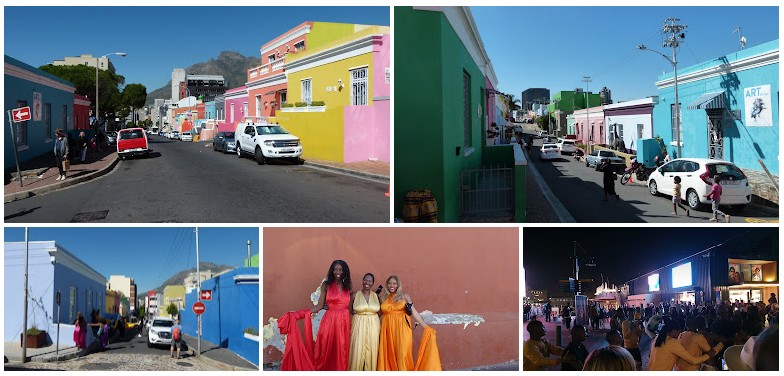
In the evening we returned to the harbour retail area, where a local choir/dance group was performing. It was Sunday so possibly it's a religious group? We had no idea what they were singing. It sounded a bit like: Hasa Diga Eebowai from the 'Book of Mormon'?
There's no shortage of fun in Cape Town.
The city is, nominally, similar in population numbers to Sydney but the CBD is noticeably smaller and although some suburbs are strikingly similar, the high quality dwellings do not compare to Sydney's, in number or spread but we discovered, in a local real estate window, that R12,000,000 (A$ one million) will buy you an 8 bedroom boutique guesthouse on a couple of acres in a safe area near Stellenbosch.
The next day we set out for Stellenbosch passing kilometre after kilometre of settlement chanties, in which something like two thirds of the population lives. They were expanding, at the fringes, before our eyes.
